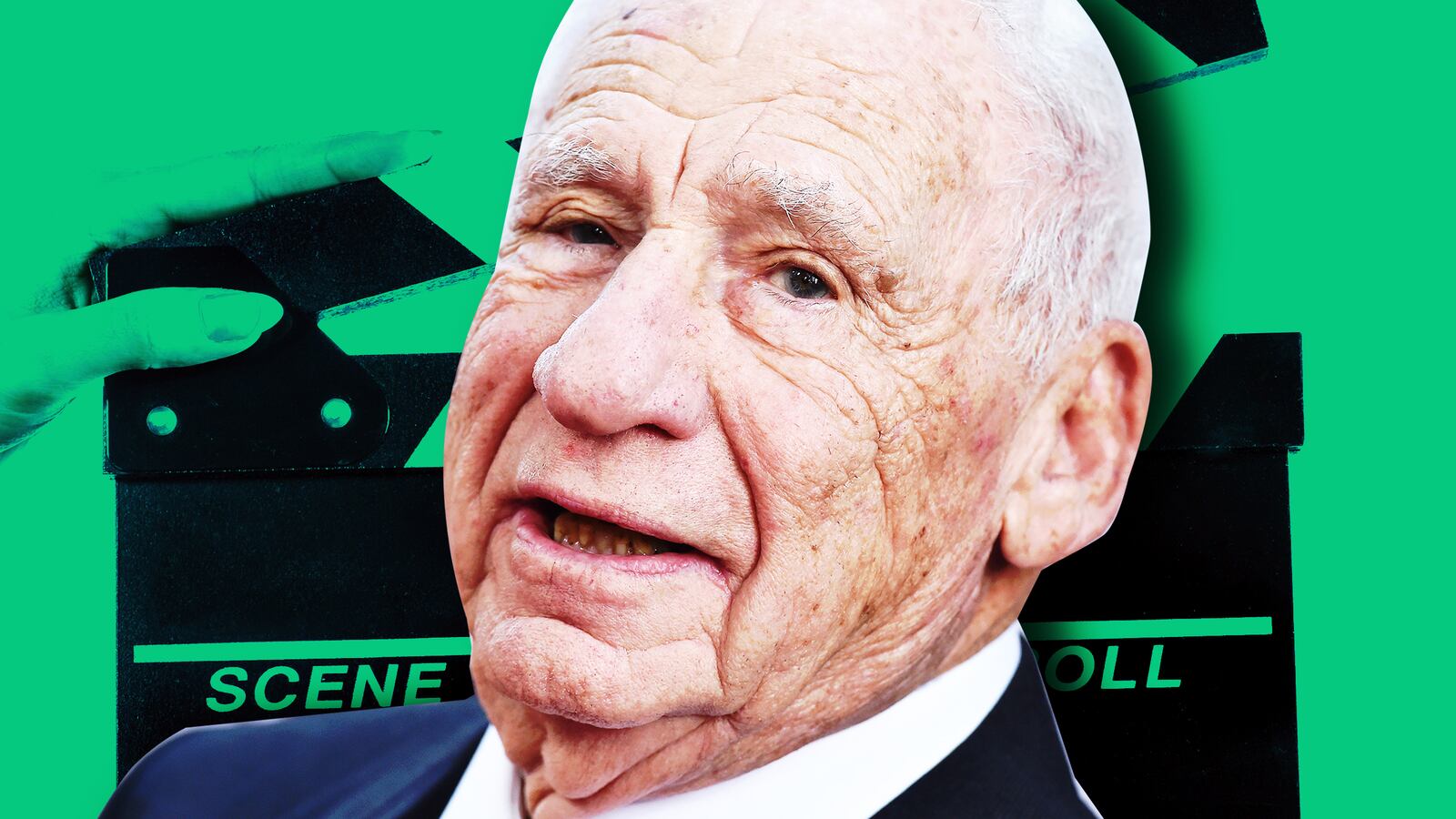Before I can get a question out, Mel Brooks jumps in.
“What would you like to know?” he begins. “I can tell you this. On April 26th, I’ll be on stage at the Chinese Theatre in Hollywood celebrating the 50th—hard to believe!—anniversary of this movie, The Producers, that Zero Mostel said no to.”
Perhaps at 91 years old, Brooks just doesn’t have to time to wait and see what you want to ask him. And he has plenty to say, especially as he prepares to be honored for his first feature film at the TCM Classic Film Festival this month, almost 50 years to the day after he won the Academy Award for Best Original Screenplay.
While Gene Wilder jumped at the opportunity to portray Leo Bloom, Brooks explains that Mostel initially had no interest in playing his counterpart Max Bialystock. “He said, ‘Two Jews putting on a Hitler thing? No, it’s stupid, it’s crazy, no, I’m not going to do it,’” Brooks continues. “And then, I think two years later he did Ionesco’s The Rhinoceros and I said, ‘You didn’t want to do this but you’ll run around on stage playing a rhinoceros for two hours?’”
Brooks says it was their mutual friend, the sculptor Speed Vogel, who helped him convince Mostel to take what would become one of his most iconic roles. “Speed said, ‘Look, Zero’s crazy, but his wife [former Radio City Music Hall Rockette Kathryn Harkin] is not,’” he remembers. “He said, ‘Let me get the script to Katie, let her read it.’”
They got an early draft of the script, which at that time was called Springtime for Hitler, to Mostel’s wife. (Brooks reluctantly agreed to change the title to The Producers only after the studio head told him, “They’re not going to put ‘Hitler’ on a marquee.”) Mostel’s wife loved the script so much, she told her husband he would do the film or “you’ve got yourself a divorce,’” Brooks says, laughing. “She was that tough. She said, this is the best thing that has ever come across our letterbox and you’ve got to do it. So Zero did it.”
After the movie came out, Mostel told Brooks, “You know, it was surprisingly good.” Not only did it land Mostel a Golden Globe nomination, but it also won Brooks his first and only Oscar and launched a career that has lasted more than 50 years and includes such legendary films as Young Frankenstein, Blazing Saddles and Spaceballs.
Below is an edited and condensed version of our conversation — once I was able to start asking questions.
So an audience is going to see The Producers on the big screen this month as part of the TCM Classic Film Festival —
That’s why I’m doing it. Because nobody who was born 20 years ago has ever seen a Mel Brooks movie on anything but a telephone. Or a TV set. The truth is, I made a lot of movies, but I don’t think anybody in their 30s down has ever seen any of my movies on the silver screen in the dark with a couple of hundred people around them enjoying the community laugh. A lot of people laughing together is a great feeling. But, you know, two or three people in a living room — and I hear the Chinese Theatre is a thousand people. Will you do it? Sure. I’ll go anywhere, anytime if you show my movie on a big screen.
Do you think it will still have the same impact on audiences today as it did when it was first released 50 years ago?
Better. It’ll be better because when it was first released there was still shades of the Holocaust and it wasn’t in such good taste with the swastika and Hitler. But now, that has faded a little. So I think it’ll go well. You know, the idea of two Jews in New York producing Springtime for Hitler to make sure they have a failure so they can get more money with a flop than they could with a hit, I think they’ll get that. And the genius and the tears in seeing Zero and Gene Wilder again on the screen. Especially the blue blanket scene with Gene Wilder, you know, “I’m hysterical and I’m wet.”
My favorite thing with the blue blanket is later in the movie, Zero and Gene are sitting there and Gene is reading. He’s talking about the investors. “Mrs. Resnick 35 percent, Mrs. Biddle 60 percent.” He’s going way past 100 percent. So Zero says, “How much percentage can there be in the show?” And Gene says, “There can only be 100 percent.” And Zero says, “How many percent have we sold in Springtime for Hitler?” He says, “18,000 percent.” And then Zero says, “Give me that blue thing” and grabs the blue blanket and puts it across his face. It’s a beautiful scene.
It’s now been almost two years since you lost your friend Gene Wilder. What did he do as Leo Bloom in this movie that made you want to keep collaborating with him over the next several years?
He was exceptionally talented. Not as a comic so much, but as an actor. He played every moment with such feeling and reality. And he didn’t talk fast. Actors know their lines. So one actors says their line, the other actor says his line right away. And Gene would say to me, no, you have to listen to what the other guy is saying. You have to respond, but you can’t talk right on top of him. Gene knew that you have digest something and respond. And he took his time with everything. Except when he was hysterical and then he just went nuts. You know, it’s probably my best movie.
And it was your first movie.
It was my first movie and there’s only a few scripts that I wrote totally without anybody else. It’s very special. You know what it is? It’s very much like your first born child. The first born child you have is definitely a miracle. And then it becomes a pain in the ass.
What did winning the Oscar for screenwriting for your first feature film mean to you at the time?
I was against probably one of my favorite pictures of all time, The Battle of Algiers. I thought, we don’t have a chance here. I said to the people who were with me, the Academy knows that’s a masterpiece. And Stanley Kubrick’s 2001, that’s another giant masterpiece picture. So I said, I’m not going to get a speech ready. So they called my name. Frank Sinatra called my name. I came on stage and I really didn’t know what to say. I wanted to thank Zero and I thanked Gene Wilder three times in a row. And then I wanted to tell everyone what a big moment this is for me, “I want to tell you what’s in my heart.” I took a beat and I went, “Ba-bump, ba-bump, ba-bump, ba-bump.” And then I said thanks and I left. I always had to be funny, no matter what. I’m a stand-up comic and I had to score.
That reminds me of the moment with President Obama when you received the National Medal of Arts and it looked like you pretended to pull down his pants. Did that come to you in the moment?
It was heavy and I fell and he helped me up and that’s why it looked like I was pulling on his pants. But you know, you’ve gotta get a laugh. Nothing is so sacred that you don’t earn your laugh. You’re a stand-up comic first and then maybe Tolstoy later, but first a stand-up comic.
There have been many parallels drawn between The Producers and the Trump campaign in the sense that he was actually hoping to lose the presidency. Do you think that is an apt comparison?
[Laughs] I don’t know if he was really trying to lose. I’m not sure he wanted it, but I don’t think he was actively trying to lose it because, you know, anything important you don’t give up. I think what he really wanted was maybe to be president for a month or so, so he could be in the books and wear the crown and then say, “Look, this is not really my job. I’ve got a show to do.” But he didn’t know they don’t let you quit. So it backfired and now it’s every minute. But who knows if the Democrats have anybody [who can beat him], because really it’s a big show and he’s a big celebrity. And I think, America votes for a celebrity. I don’t think they vote for somebody who’s a great administrator.
Do you find Trump to be funny or not so much?
You know, I think he saved late-night television. I’m very grateful to him for that. Between Conan and Jimmy Kimmel and Colbert, he saved these guys! They’ve built careers on his doings. We are grateful to him for his contribution to showbiz. Other things are not so terrific.
As someone who fought in World War II and has spent a lot of time thinking about Hitler and the Holocaust, do you worry about the recent rise of anti-Semitism in America?
Always. I’m worried about it, I really am. I’m seriously worried about it. I’m worried about it all over the world. So far, Germany has been the best. But now I’m afraid the right is rising in Germany. I’m so happy that Angela Merkel won, because I was so afraid that things were going to go badly. And I was so glad that Macron beat Le Pen [in France]. I was really worried there because I thought, uh oh, here they come. We’d better build trenches and wear helmets.
People forget.
They do forget. When you say Holocaust, they say, “What’s that?” They don’t even know about it.
It’s not something you can forget about.
Right, well, I was there so...
So you said you think The Producers will get an even stronger reception because we’re further away from Hitler, but I know you’ve also spoken before about how you don’t think you could get Blazing Saddles made today. How do you think political correctness is impacting the type of comedy that is being produced now?
I’ve never been a fan of political correctness. I’ve been a fan of decent behavior, which is different from political correctness. Because political correctness demands too much respect for being good. And comics are not good. We are bad. We whisper into the king’s ear. We tell him the truth. And that’s our job. It’s our job to say it like it is. And sometimes use the words that we use in the street. You can’t always play ball with the system, you have to strike out and tell the truth.
Do you think people are too concerned about hurting feelings these days to do that?
I think that people enjoy — that people love the comics that break the rules, that’s what I think. I think it’s only a sliver that really love political correctness. Everybody else likes the truth, which is different.
One last question for you: How do you maintain the energy to keep working at 91?
I don’t know. Truthfully, I think it’s the gift of a good constitution. My mother lived into her 90s. But I would say personally, it’s Raisin Bran. The raisins are sweet and it has iron and they have energy. The bran helps keep you regular. So it’s either ancestral good bodies and good brains coming my way from the past, or, to be honest, it could be Raisin Bran.






